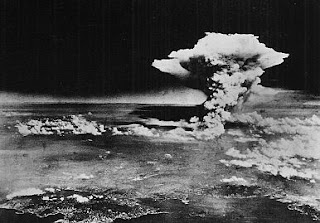Ankit Panda, The Diplomat: Was Nuclear Weapon Use in Hiroshima Really a Turning Point in World War II?
Bombing Hiroshima and Nagasaki did little to convince Japanese leaders to end the war.
U.S. President Harry S. Truman’s decision to use nuclear weapons against the civilian populations of Hiroshima and Nagasaki stands as one of the most consequential uses of weaponry in human history, a watershed moment in the twilight days of World War II, and a perennial question of moral and strategic ambiguity. In fact, all contemporary conversations about the dangers of nuclear weapons and their proliferation inevitably evoke their two uses in wartime on August 6 and August 9, 1945.
Commentaries, Analysis, And Editorials -- August 6, 2015
How the Hiroshima bombing is taught around the world -- Herman Wong, Washington Post
70 Years After Atomic Bombs, Japan Still Struggles With War Past -- Scott Neuman, NPR
Nuclear Deterrence 70 Years After Hiroshima -- Adam Lowther, Real Clear Defense
Can Iraq’s Baathists Become Allies Against Islamic State? -- Yaroslav Trofimov, WSJ
The absence of a Yemeni breakthrough -- Haifa AlMaashi, Special to Gulf News
The Strategic Impact of the Iran Deal -- Walter Russell mead, American Interest
Why the crisis in Burundi is tying the African Union in knots -- Simon Allison, The Guardian
ISIS Rises in Libya -- Jon Lee Anderson, New Yorker
Seize Upon the Taliban Split -- Anatol Lieven and Rudra Chaudhuri, NYT
Citing threats, Pentagon refocuses on Russia -- Philip Ewing, Politico
Russia's Arctic claim: What's the message? -- Denise Hassanzade Ajiri, CSM
Crisis, what crisis? say tourists flocking to Greece -- Jeremy Gaunt, Reuters
Freedom of speech case outrages Germany -- Damien McGuinness, BBC
How a treason case in Germany set off a political firestorm -- Julia Smirnova, Washington Post
Venezuela is basically bankrupt again -- Matt O'Brien, Washington Post



No comments:
Post a Comment